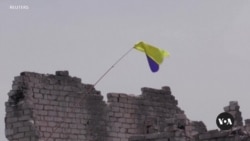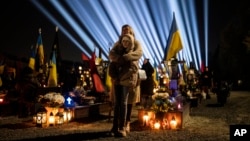Ukraine attempted to break through the lines of invading Russian forces in 2023 in the east of the country, as the West stepped up the supply of heavier weapons and advanced missile systems. However, neither side appears able to make a significant breakthrough and there is little sign that Kyiv and Moscow are prepared to negotiate a peace deal.
At an end of year news conference December 19, Ukrainian President Volodymyr Zelenskyy said that Russia had failed to achieve any victory in 2023. "Our yellow and blue flag is in Ukraine, and this is our main victory. And the main thing is that we will preserve it — not only in our hearts, but we will actually preserve it all for our future generations," Zelenskyy said.
The conflict has intensified into a war of attrition, at huge cost to both sides. A declassified U.S. intelligence report published earlier this month estimated that some 315,000 Russian troops had been killed or injured — nearly 90% of the personnel it had when the conflict began, according to Reuters. Ukraine does not release figures relating to its losses, but an August report in The New York Times citing U.S. officials put the Ukrainian death toll then at close to 70,000.
This year began with a strategic loss for Ukraine as Russian forces seized the salt-mining town of Soledar in January, after months of brutal fighting. Meanwhile, Russian missiles continued to rain down on Ukrainian cities, exerting a heavy toll on the civilian population.
With Ukrainian forces struggling to make battlefield gains, Western allies announced they would send heavy weapons to Kyiv, including tanks and longer-range missile systems.
Ahead of the first anniversary of the war in February, U.S. President Joe Biden made an unannounced visit to Kyiv. He said Russian President Vladimir Putin had been wrong about Western commitment to Ukraine. "He thought he could outlast us. I don't think he's thinking that right now," Biden told the crowd in Kyiv.
Evidence suggests Russia destroyed the Kakhovka dam in May, flooding vast areas of southeast Ukraine to stall any Ukrainian counteroffensive and creating an environmental disaster. Russia, in return, blamed Ukraine for the structure's collapse.
By June, Ukraine was able to recapture some territory but failed to break through the Russian lines. The Western weapon supplies were too little, too late, says analyst Ian Bond.
"The delays in supplying this equipment meant that the Russians had a long time to build up their minefields and their fixed fortifications, so they're actually in a much stronger position than they were. And we've been asking the Ukrainians to launch their counteroffensive when they have very little air capability," Bond told VOA, adding that Ukraine had made remarkable progress in countering Russia's navy.
"They have effectively removed the Russian Black Sea fleet from most of the western Black Sea. The Ukrainians have been able to start exporting grain from their ports on the Black Sea more freely than they could before. And that's a remarkable achievement for a country that has no functioning navy," he told VOA.
Mercenaries from Russia's private Wagner army staged a mutiny in June, demanding the dismissal of Moscow's defense minister over claims that Wagner fighters had been deprived of support and ammunition by the Russian army. Putin negotiated an end to the rebellion with the aid of his Belarusian counterpart, Aleksander Lukashenko. Wagner's chief, Yevgeny Prigozhin, was killed in a plane crash a few weeks later.
By November, Ukraine's military chief General Valery Zaluzhny said the war had reached a stalemate, though Ukraine's president disagreed with his assessment.
Zelenskyy did achieve a diplomatic breakthrough as the European Union in December agreed to start formal accession talks. "The negotiation process will not be easy, but the main thing is that historically we have made a determination: Ukraine will always be part of our common European home," Zelenskyy said in video published on social media after the EU decision.
But that European future remains in the balance, says analyst Olga Tokariuk of Britain's Chatham House. "If Ukraine is defeated, if Ukraine fails militarily, all the EU membership negotiations process is worthless. But it will not just be a defeat of Ukraine. It will be a defeat of the European Union and the wider West, that committed to supporting Ukraine as long as it takes."
Ukrainian forces face a long bitter winter on the front lines. The military in December asked Zelenskyy for an additional 450,000 to 500,000 people to be mobilized into the army.
There is hope that the coming year will see Western deliveries of F-16 fighter jets to Kyiv. But with vital military aid packages held up in the both the United States and the European Union, analysts say Ukraine's greatest concern for the coming year is Western fatigue.
Zelenskyy insisted he was confident the military aid would be forthcoming. "I am sure that the United States of America will not betray us and that what we have achieved with the United States will be fulfilled," Zelenskyy said at his end of the year news conference.
The U.S. presidential election looms at the end of 2024, and there is nervousness in Ukraine and Europe, said Fabrice Pothier, a former head of policy planning at NATO and now CEO of the consultancy group Rasmussen Global.
"Losing the U.S. in the sense of having a U.S. president who might be actually counter to Ukraine's interests and to Europe's interests would be a major blow," he told VOA.
Russia is also due to hold presidential elections next year. With the vote neither free nor fair, according to analyst Ian Bond, Putin is all but certain to win – but the election could affect his war strategy. "He will be looking for something that he can portray as [a] military success in the run-up to the election," Bond said.







